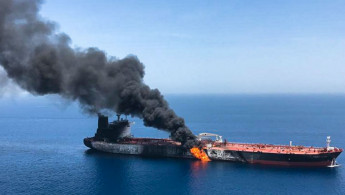Oil prices soar following Gulf tanker attacks
Thursday's reported attacks, the second incident involving shipping in the strategic sea lane in a matter of weeks, sent London's Brent North Sea oil rebounding more than four percent in morning deals before trimming gains.
The Gulf of Oman lies at the other end of the strategic Strait of Hormuz from the Gulf, part of a vital shipping lane through which at least 15 million barrels of crude oil and hundreds of millions of dollars of non-oil imports pass.
According to Iranian state media, one of the tankers - the Norwegian-owned Front Altair - was carrying ethanol from Qatar to Taiwan, while the Kokuka Courageous was carrying methanol from Saudi Arabia to Singapore.
'Tension is high'
"Tension across the Middle East is high - and the attacks on two tankers has further exacerbated the situation, even though there does not appear to have been any damage to the cargos," said John Hall, chairman of British-based consultancy Alfa Energy.
"As a consequence the market has responded dramatically with an increase in the oil price of (as much as) four percent," he told AFP.
"How long it will hold for is another matter - and it has already fallen back slightly."
Twitter Post
|
Around midday in London, Brent for August delivery pulled back to stand at $62 per barrel, up $2.03, or more than three percent, from Wednesday.
New York's West Texas Intermediate was $1.52 or around three percent higher at $52.66 per barrel.
It was a huge turnaround for the oil market, which had slumped Wednesday on news of soaring crude inventories in the United States that indicated weak demand growth.
Thursday's reported attacks came amid simmering tensions between Tehran and Washington, which pointed the finger at key oil producer Iran over previous tanker attacks in May.
Markets are paying particularly close attention after US President Donald Trump abandoned a landmark 2015 nuclear deal with the Islamic Republic last year. Punishing sanctions levied on Iranian oil are likely to upset the global oil market.
Retaliation fears
"Investors will be keeping a keen eye on the developments in the Gulf of Oman as tensions in the Middle East have been rising since President Trump withdrew from the Iran deal," Sun Global Investments chief Mihir Kapadia said in a note.
"Although US National Security Adviser John Bolton has accused Iran of a similar incident before, the country has distanced itself from today's attacks," he said.
"From this, the biggest concern will be a retaliation which could leave markets looking shaky in the meantime, with Iran potentially being met with more severe sanctions which could really affect its oil output and economy if found guilty," Kapadia added.





 Follow the Middle East's top stories in English at The New Arab on Google News
Follow the Middle East's top stories in English at The New Arab on Google News
![Netanyahu furiously denounced the ICC [Getty]](/sites/default/files/styles/image_330x185/public/2024-11/GettyImages-2169352575.jpg?h=199d8c1f&itok=-vRiruf5)
![Both Hamas and the Palestinian Authority welcomed the ICC arrest warrants [Getty]](/sites/default/files/styles/image_330x185/public/2024-11/GettyImages-2178351173.jpg?h=199d8c1f&itok=TV858iVg)
